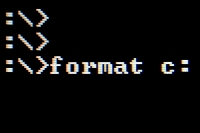Reggie X. Preston
by Alex Papadimoulis
in Feature Articles
on 2007-05-14
At the time, it seemed like a good idea. When a fatal error would occur in a batch program, a message would be sent to the operator’s console that notified him of the error and prompted him to terminate the program. From there, the operator would call the program’s support contact (generally a programmer) and ask him what to do. Management figured that someone with some knowledge of the program should be the one that decides, not just some operator.
Of course, as the years passed by, management learned three things about this policy. First, the support contact’s answer was always “it’s a fatal error! What can I possibly do from home at 2:00 AM? Just terminate it!” Second, after years and years of developing batch programs for internal clients, there were a whole lot of batch programs (about 20,000 in all) and a whole lot of programmers that were called in the middle of the night. And third, because the operator notification would block until an answer was received, subsequent programs would be delayed while the operator tried to get a hold of the responsible programmer, who would occasionally disconnect his phone at night to avoid the inevitable call. Obviously, something had to be done.

 Apr 07
Apr 07 For me, a trip to the company's server room was exciting. The cold air, the hum of the servers, and the rows of servers with fun blinking lights would make me feel like I was Harrison Ford in Firewall, ready to download confidential data on a MacGuyver-ified iPod. The sad reality, though, was that trips to the server room generally meant I needed one of the administrator's signatures on some stupid paperwork.
For me, a trip to the company's server room was exciting. The cold air, the hum of the servers, and the rows of servers with fun blinking lights would make me feel like I was Harrison Ford in Firewall, ready to download confidential data on a MacGuyver-ified iPod. The sad reality, though, was that trips to the server room generally meant I needed one of the administrator's signatures on some stupid paperwork. A few kilometers left on Ruta Nacional 128, a brief stop at a control policial, a short trip down the unpaved Calle 33, and just like that, Sergio was at his destination. It was a top-secret Argentinean Government Facility.
A few kilometers left on Ruta Nacional 128, a brief stop at a control policial, a short trip down the unpaved Calle 33, and just like that, Sergio was at his destination. It was a top-secret Argentinean Government Facility. You may remember Tim from the sad tale of Hung,
You may remember Tim from the sad tale of Hung, 
 Some years ago, someone at Microsoft noticed that they were having a bit of a Resources problem. A Human Resources problem to be specific. There were a whole lot of job openings (thousands, in fact) and a whole lot of applications (hundreds of thousands, in fact), and no easy way to match the right applicants with the right jobs. So they decided to reinvent the Job Interview.
Some years ago, someone at Microsoft noticed that they were having a bit of a Resources problem. A Human Resources problem to be specific. There were a whole lot of job openings (thousands, in fact) and a whole lot of applications (hundreds of thousands, in fact), and no easy way to match the right applicants with the right jobs. So they decided to reinvent the Job Interview.  Hopefully after getting out of college, most of us have matured past drawing dude parts on passed-out roommates. Now, I don't mean to imply that I've matured beyond that point, just that I hope you have.
Hopefully after getting out of college, most of us have matured past drawing dude parts on passed-out roommates. Now, I don't mean to imply that I've matured beyond that point, just that I hope you have. It seemed like any other job: "Java/J2EE contractors needed for a one-to-three month contract to maintain proprietary supply-chain management software." Sure, James C could have waited around to find something more interesting, but the pay was fantastic and, being such a short term contract, he figured he had little to lose. That is, until he came face to face with Codethulhu.
It seemed like any other job: "Java/J2EE contractors needed for a one-to-three month contract to maintain proprietary supply-chain management software." Sure, James C could have waited around to find something more interesting, but the pay was fantastic and, being such a short term contract, he figured he had little to lose. That is, until he came face to face with Codethulhu.